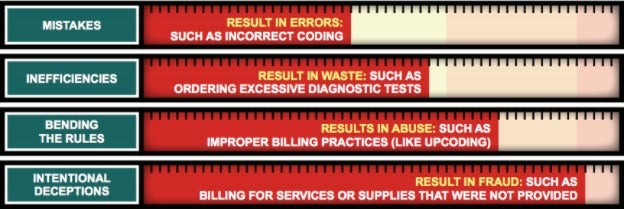Healthcare fraud is one of the most costly crimes in America, and the government devotes considerable resources to rooting out deceivers. In most cases, whistleblowers are the best source of information the government has to open investigations and obtain recoveries.
Recently, the U.S. Department of Justice announced “the largest ever health care fraud enforcement action,” charging 412 people with crimes totaling around $1.3 billion in false billings. Many of the charges were related to the prescription and distribution of opioids, according to the Washington Post. Some of them may have originated as whistleblower actions, but the DOJ did not elaborate on their myriad sources.
Many healthcare fraud cases like the ones the DOJ announced in July would not be possible without whistleblowers, who are critical to the process of uncovering fraud, waste, and abuse. Your evidence is invaluable to the government when it builds its case, and it might pay a lot for that information. Here’s why.
The Government Needs Your Healthcare Fraud Info
It’s tough to estimate the exact cost of healthcare fraud, but in 2012 Donald Berwick and Andrew Hackbarth suggested wasteful healthcare practices account for more than 20 percent of the country’s total healthcare costs. Berwick and Hackbarth identified these categories of healthcare waste:
-
Overtreatment;
-
Failures of care coordination;
-
Failures of care processes or execution;
-
Pricing failures;
-
Administrative complexity; and
-
Fraud and abuse.
Berwick previously served as an administrator for the Centers for Medicare and Medicaid Services, and Hackbarth performs research for the RAND Corporation, a nonprofit think tank.
In 2015, the CMS estimated healthcare spending climbed to $3.2 trillion, or roughly $10,000 per person. That means around $640 billion is practically earmarked for waste or fraud, if Berwick’s and Hackbarth’s estimations are correct, and the U.S. government provides a lot of those funds with Medicare Part D and other programs.
As a potential whistleblower, you’re the inside source when it comes to an investigation into this abuse. Few people have the access or relationships necessary to help the government pursue an investigation from inside a company that’s breaking the rules.
Initial meetings with the government about your whistleblower claim usually cover:
- Reviewing the allegations of your qui tam case;
- Interviews to learn about your background and your role in the company;
- Requests for more evidence or investigation on your part; and
- Determining if you’ve faced retaliation.
The government often goes back and forth with whistleblowers during an investigation because whistleblowers have inside knowledge about the situation, providing context or gathering more evidence of a crime.
At any point, the government officials assigned to your case may decide there isn’t enough information, and ask for more or even terminate their investigation. If they terminate the investigation, often you can continue to pursue your action on behalf of the government.
But hard evidence of healthcare fraud is very valuable, and one of the government’s key whistleblowing interests. If you’ve got valuable information, an attorney can help connect you with the government.
What Healthcare Fraud Does the Government Look For?
When investigating fraud, improper payments are one of the primary identifiers the government looks for. Healthcare fraud, waste, and abuse most often takes the form of:

Throughout the whistleblowing process, it’s important to remember that the government’s interest lays in the case and recovering their money. Protective measures like sealing a lawsuit under the False Claims Act incidentally protect a whistleblower by keeping a case out of the public realm until the government finishes their investigation, but that’s not the government’s main concern.
The central purpose behind the sealing of these cases is to allow the government time to conduct a through investigation without the defendant knowing about it. While the government is a key partner in these cases, only your own attorney will work for your best interests.
The Government Pays for Your Knowledge
You and the government are on the same side. Even though whistleblowers can potentially get money for their help, most whistleblowers aren’t in it for the recovery. They’re looking for justice. But working to tamp down on fraudulent behavior isn’t an easy task, and negotiating protection and payment with the government is a key aspect of the whistleblowing process. You’re uncovering where its money goes, and by bringing a case to its attention, both you and the government seek the best outcome: a significant monetary recovery.
In FY2016, payments to relators — another name for whistleblowers — totaled over $500 million out of the nearly $3.4 billion recovered by the government, according to a joint report by the Departments of Justice and Health and Human Services. Whistleblowers are entitled to 15 to 30 percent of the government’s recovery, which amounts to a significant payout in some cases.
The reality is that many whistleblowers face retaliation, which both whistleblowing and employment laws protect against. The government may be able to help protect you from wrongful termination, harassment, or other discrimination in the workplace if you decide to become a whistleblower.
Do I Need a Whistleblowing Attorney?
Working with the federal government may seem daunting at first, but the attorneys and investigators most involved in these cases — the Federal Bureau of Investigation, the U.S. Department of Justice, and local United States Attorney offices — have considerable resources that make investigating and prosecuting healthcare fraud claims easier.
Our attorneys have experience working alongside the government on whistleblower actions, and the relationships that can help get your allegations clearly heard, fully investigated, and prosecuted, if your case eligible. We can also negotiate on your behalf, and continue your case if the government chooses not to intervene.
If you work as a healthcare professional in a hospital, nursing home, clinic, or any other facility, and you think you may be witnessing healthcare fraud, waste, and abuse, contact us today for options.
Posted in






